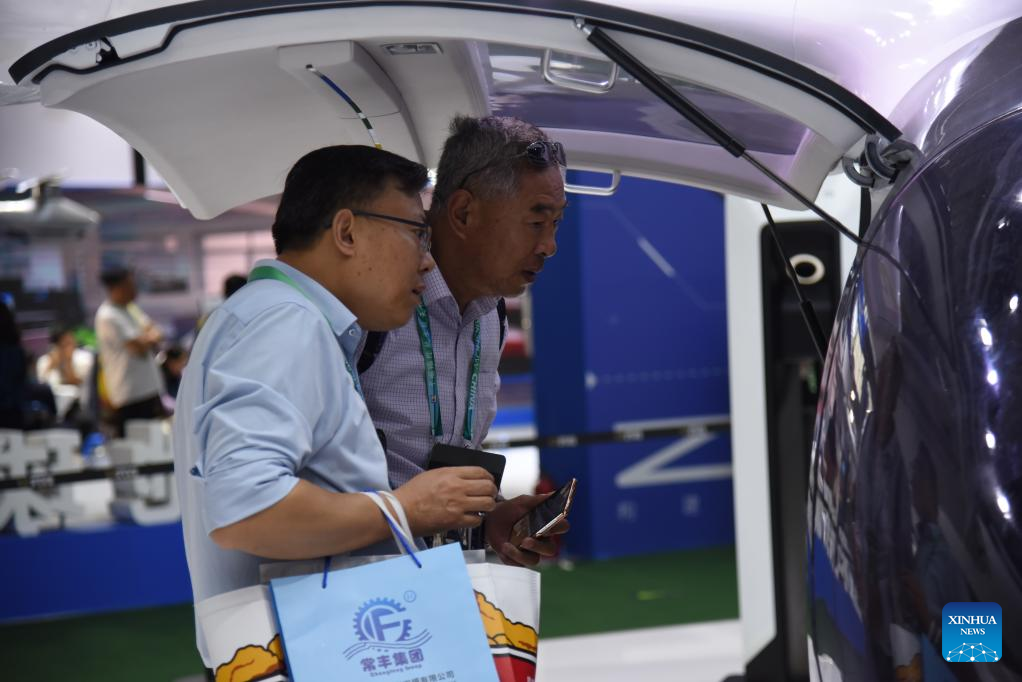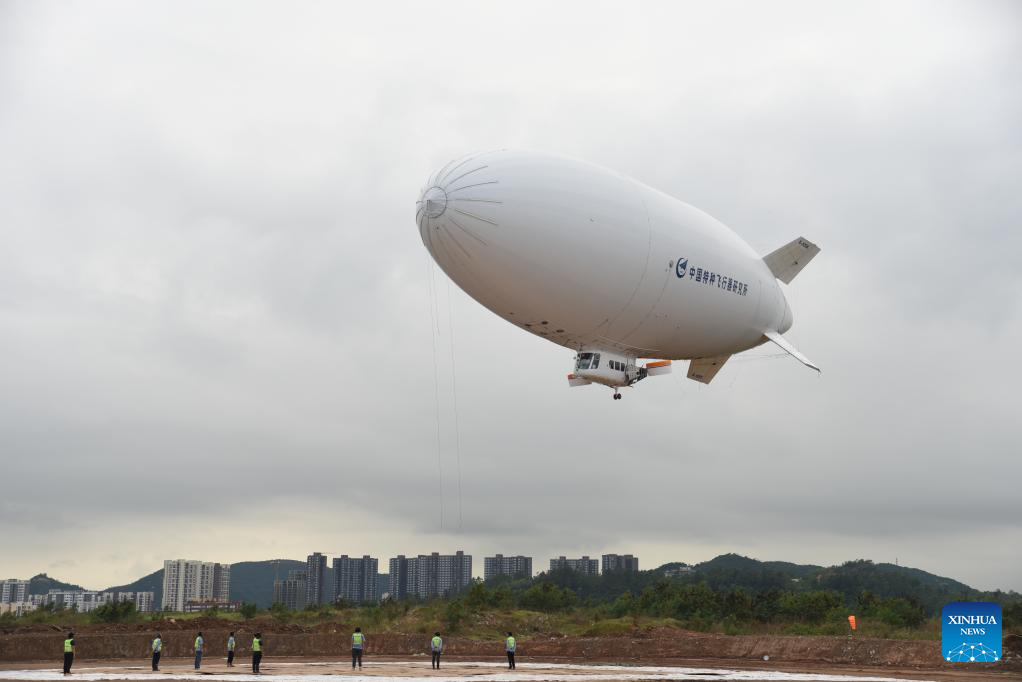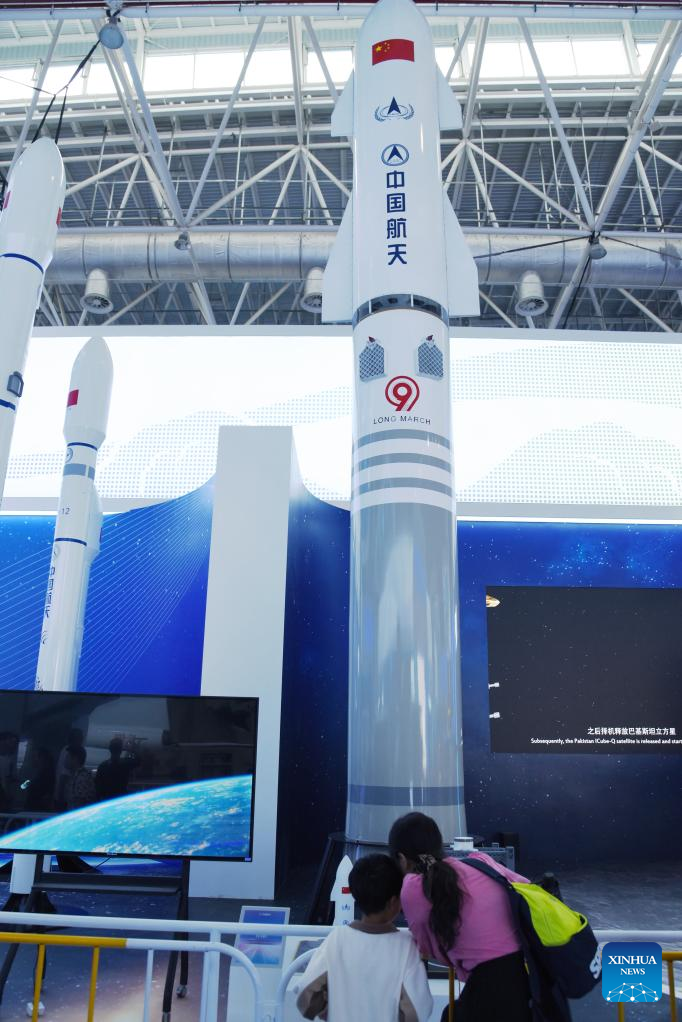China's skyward dream unfolds at Airshow China
Xinhua, November 18, 2024 Adjust font size:

Visitors look at an electric vertical take-off and landing (eVTOL) aircraft during the 15th China International Aviation and Aerospace Exhibition, also known as Airshow China, in Zhuhai, south China's Guangdong Province, Nov. 13, 2024. (Xinhua/Hong Zehua)
by Xinhua writers Hong Zehua, Hu Tao and Ye Ting
GUANGZHOU, Nov. 17 (Xinhua) -- Having journeyed over 380,000 kilometers from the far side of the moon to the exhibition hall of the recent 15th Airshow China, a sample of lunar soil brought back by the country's Chang'e-6 mission captivated countless curious onlookers.
Displayed alongside the returning capsule and parachute of the Chang'e-6 lunar probe, the lunar sample became the centerpiece of the China National Space Administration's (CNSA) exhibit. The showcase was aimed at highlighting China's recent advancements and international collaborations in space exploration, according to Zhang Tao, an official from CNSA.
From the mythical tale of "Chang'e Flying to the Moon" to the tangible grains of lunar soil now admired and photographed, this 75-milligram fragment stands as a vivid testament to how China's ancient dream of flight has transformed into a groundbreaking reality.
"I felt immense pride for our nation when I saw the lunar sample, alongside the advanced planes and rockets on display," said Tsang Cheung Sam, a visitor from Macao Special Administrative Region attending the airshow, which concluded on Sunday.
"I've heard about the International Space Station since I was young, but now we have China's space station soaring above us. It feels like a dream come true," said Tsang.
On Friday, China launched the cargo craft Tianzhou-8, delivering supplies to the Tiangong space station. Meanwhile, more options for space delivery are in the pipeline, as the Aviation Industry Corporation of China (AVIC) unveiled its reusable winged space cargo vehicle at the airshow.
Named Haoloong, the innovative shuttle can re-enter Earth's atmosphere, fly, and land horizontally at designated airports. This capability allows for recovery and reuse in an airline-like operational model, aiming to significantly reduce the cost of transporting cargo to and from China's space station, according to AVIC.
"Haoloong marks a new starting point for AVIC to leverage its aeronautical expertise in developing commercial aerospace products," said Wu Jiwei, an AVIC spokesperson.
During the airshow, AVIC tested its civil manned AS700 airship and secured a purchase order for 10 units along with intent to purchase agreements for 164 more.
The airship was even sold online during China's annual "Double 11" shopping spree on the e-commerce platform Taobao.
Jingmen Urban Construction Investment Holding Group Co., Ltd., which purchased the AS700 airship online, subsequently signed an intent to purchase order for an additional 60 airships. According to the company's chairman, Cheng Xiong, a study conducted among passengers and several scenic areas revealed strong public enthusiasm for the airship's operations.
Initially, the airships will be deployed for low-altitude tourism, Cheng explained. Their applications are set to expand into areas such as aerial photography, city inspections and other innovative scenarios.
At the center of the Low-Altitude Economy Pavilion at the airshow, a six-seat electric vertical take-off and landing (eVTOL) aircraft in white, black and yellow captivated visitors. Many crouched down to inspect its blades, climbed into the cockpit or examined the charging station nearby.
The eVTOL aircraft, a testament to China's growing low-altitude aviation industry, was developed by Aerofugia, a subsidiary of Geely Auto, a leader in electric vehicles. During the airshow in Zhuhai, the company launched the batch production version of its AE200 manned tilt-rotor eVTOL aircraft.
Aerofugia, headquartered in Chengdu, has already secured its first order of 100 eVTOLs from Sino Jet, a Chinese business aviation management firm. Earlier this year, the U.S. publication Aviation Week recognized Aerofugia as one of the top 10 eVTOL developers worldwide.
Slated to start manned verification flights in 2025, the AE200 is expected to play a vital role in urban transportation, aerial sightseeing and emergency rescue missions, according to the company's CEO and chief scientist Guo Liang, who received the award of "Person of the Year" at the 16th China Aerospace Laureate Awards at the airshow.
As more low-altitude aircraft take to the skies, China's low-altitude airspace is becoming increasingly busy. Hou Yi, senior product manager at Aerofugia, believes that in the not-too-distant future, electric aircraft will become more common in the skies.
"From the Wright brothers' first airplane in 1903 to today, a little over a century has passed. It's been just 66 years since humans landed on the moon. This rapid technological development shows the power of dreaming and exploring. What seems impossible today can become reality if we strive to make it happen," said Hou. ■

A civil manned AS700 airship prepares to land during the 15th China International Aviation and Aerospace Exhibition, also known as Airshow China, in Zhuhai, south China's Guangdong Province, Nov. 15, 2024. (Xinhua/Hong Zehua)

Visitors look at a model of the Long March-9 rocket during the 15th China International Aviation and Aerospace Exhibition, also known as Airshow China, in Zhuhai, south China's Guangdong Province, Nov. 15, 2024. (Xinhua/Hong Zehua)